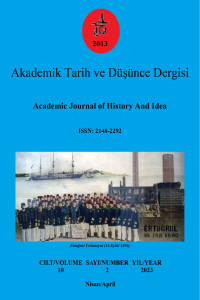Struggle and Lonely Sorrow in Byron's Romanticism (Based on Poems " the Giaour", "the Corsair", "the Bride of Abydos" and "the Prisoner of Chillon")
Öz
The article mentions the public-social and literary-aesthetic problems of "Oriental Poems" by George Gordon Byron, one of the most prominent representatives of English revolutionary romanticism in world literature. The author gives a scientific interpretation of Byron's poems "Giaour", "Corsair", "the Bride of Abydos" and "The Prisoner of Chillon" and studies the literary-aesthetic and public-social problems of the poet's revolutionary romanticism. At the beginning and middle of the 20th century, scientific interest in Byron's literary heritage increased in Turkiye and Azerbaijan, and the poet's "Oriental Poems" were translated into Turkish and Azerbaijani. The author notes that Abdulla Jovdat Bey sent the poem “The Prisoner of Chillon” translated from Byron in 1906 as a gift to his close friend Ali Bey Huseynzadeh. Ali bey Huseynzadeh, in his article “English Poetry in Turkish” and the “Prisoner of the Chillon”, published in the newspaper “Hayat”, highly appreciated the translation skills of Abdullah Jovdat Bey and spoke about the ideological and aesthetic merits of the poem. The analysis involved translations of three lines from Byron's “Oriental poems” into Azerbaijani by Novruz Ganjali, Bakhtiyar Vahabzadeh and other poets. The struggle and lonely grief of the romantic heroes of the poet has also been characterized in the article. The “Oriental poems" reflectes the vices committed by Eastern despotism. Militant and romantic, the lonely heroes of Byron's poetry reflect the characteristic features of English revolutionary romanticism and rise to the level of the "Byronic hero".
Anahtar Kelimeler
"Oriental poems" "Byronic hero" linear translation lonely hero progressive romantics despotism
Struggle and Lonely Sorrow in Byron's Romanticism (Based on Poems " the Giaour", "the Corsair", "the Bride of Abydos" and "the Prisoner of Chillon")
Öz
The article mentions the public-social and literary-aesthetic problems of "Oriental Poems" by George Gordon Byron, one of the most prominent representatives of English revolutionary romanticism in world literature. The author gives a scientific interpretation of Byron's poems "Giaour", "Corsair", "the Bride of Abydos" and "The Prisoner of Chillon" and studies the literary-aesthetic and public-social problems of the poet's revolutionary romanticism. At the beginning and middle of the 20th century, scientific interest in Byron's literary heritage increased in Turkiye and Azerbaijan, and the poet's "Oriental Poems" were translated into Turkish and Azerbaijani. The author notes that Abdulla Jovdat Bey sent the poem “The Prisoner of Chillon” translated from Byron in 1906 as a gift to his close friend Ali Bey Huseynzadeh. Ali bey Huseynzadeh, in his article “English Poetry in Turkish” and the “Prisoner of the Chillon”, published in the newspaper “Hayat”, highly appreciated the translation skills of Abdullah Jovdat Bey and spoke about the ideological and aesthetic merits of the poem. The analysis involved translations of three lines from Byron's “Oriental poems” into Azerbaijani by Novruz Ganjali, Bakhtiyar Vahabzadeh and other poets. The struggle and lonely grief of the romantic heroes of the poet has also been characterized in the article. The “Oriental poems" reflectes the vices committed by Eastern despotism. Militant and romantic, the lonely heroes of Byron's poetry reflect the characteristic features of English revolutionary romanticism and rise to the level of the "Byronic hero".
Anahtar Kelimeler
"Oriental poems" "Byronic hero" linear translation lonely hero progressive romantics despotism
Ayrıntılar
| Birincil Dil | İngilizce |
|---|---|
| Konular | Tarihsel, Karşılaştırmalı ve Biçimsel Dilbilim, Dilbilim (Diğer) |
| Bölüm | Makaleler |
| Yazarlar | |
| Erken Görünüm Tarihi | 4 Haziran 2023 |
| Yayımlanma Tarihi | 25 Haziran 2023 |
| Kabul Tarihi | 20 Mart 2023 |
| Yayımlandığı Sayı | Yıl 2023 Cilt: 10 Sayı: 2 |
По всем вопросам приема статей и выпуска очередных номеров обращаться в редакцию соответствующего журнала


